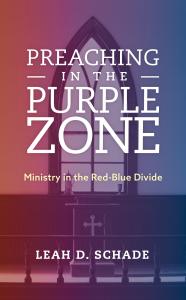We want to keep the Body of Christ together. But are there times when it’s okay that parishioners leave because they oppose the preaching and teaching of the gospel?

I’ve been asking this question in my research with clergy who preach and teach about social issues. Beginning in 2017 just after the contentious presidential election, I surveyed 1200 mainline Protestant clergy. I wanted to understand what they faced when preaching in that contentious time. Since then I’ve taught, trained, interviewed, or had informal conversations with hundreds of clergy and laity about ways to navigate political divisiveness in the church.
Ideally, we want to find a way to “inoculate” the Body of Christ against the “viruses” of divisiveness and polarization.

In Preaching in the Purple Zone: Ministry in the Red-Blue Divide (Rowman & Littlefield, 2019), I recommend deep listening to understand people’s stories of how they come to believe what they do. I suggest using a process called the sermon-dialogue-sermon method to biblically and theologically root a social issue and then engage in healthy civil discourse. I urge clergy and parishioners to focus on relationship-building, finding common values, establishing trust, and practicing Spirit-led compassion. Engaging in dialogue and honoring people’s stories can sometimes lead to changed hearts and minds, by the grace of God.
For instance, one pastor shared with me what she does when she receives pushback about a sermon. She invites the congregant to sit down with her and review the content of the biblical passage and sermon. In this pastoral conversation, she asks them to show her where she veered from the theological tenets or the gospel. “It usually ends up as the first of several pastoral care sessions as people realize that they put up barriers to hearing the true gospel message. It is a process of eye-opening realization.”
This is not to say that sometimes these conversations don’t also reveal that the pastor was off the mark in their biblical interpretation, sermon content, or tone. Such a dialogue assumes good faith on the part of both clergy and parishioner to discern and learn together.
But what do you do when these approaches do not work?
What happens when people refuse to engage in constructive conversation? When they walk out of sermons? Threaten to withhold their offerings? Threaten to leave the church?
If this has happened in your congregation, you’re not alone. And it raises difficult questions.
How do we handle those who want to silence the pastor’s prophetic voice? Or stop a congregation from engaging social issues? How do we call out harmful behaviors while still remaining pastoral? Do we simply preach the gospel and let the chips fall where they may – including letting go of the people who are angry? At what point do we let them go with God and concentrate on doing the prophetic work without worrying about offending the privileged?
I don’t have the answers to these questions.
But as the U.S. body politic continues to deteriorate and the stark reality of our downward spiral is undeniable, the Body of Christ will continue to feel the effects of this crisis. People have decisions to make. This is going to become more and more the case for congregations in the weeks and months leading up to and following the election. So I think it’s time to ask these difficult questions among our colleagues, in our church leadership meetings, and with our denominational leaders.
Are we really supposed to be one big, happy family?
Jesus himself recognized that holding fast to his teachings may place you in opposition to people you’re supposed to hold in high regard. This may include your family members, your employer, elected leaders, and even your fellow Christians. But it can be especially difficult for congregants who cling to the notion of being a “family” in Christ.

As much as we want the body of Christ to hold together, Jesus warned against the seductive trope of the family.
“You will be betrayed even by parents and brothers, by relatives and friends; and they will put some of you to death. You will be hated by all because of my name. But not a hair of your head will perish. By your endurance you will gain your souls” (Luke 21:16-19).
Endurance is exactly what is required of clergy who dare to speak prophetically in this divisive climate. The stress of trying to hold things together takes a tremendous toll on a minister’s physical, emotional, mental, and spiritual health. And sometimes, despite our best efforts to build bridges of understanding, people still leave. And it can get ugly.
Should they stay or should they go?
Undoubtedly, there can be tremendous pain and loss when people leave a congregation over politics. Most of the time, we keep our political disagreements quiet. Maintaining harmony and peaceful relationships allows us to continue to pack the food bags for the pantry ministry. And serve together on the Altar Guild. And fix the church’s leaky roof. Or engage in pleasant chit-chat over coffee and cookies after the service.
But sometimes the gospel confronts us with values that are counter to a white supremacist, nationalist, militaristic, xenophobic, homophobic, misogynistic, anti-environmental, or ableist agenda. Even without mentioning a specific president, a sermon that preaches the values of welcoming the immigrant, obeying the commandment not to murder, lifting up “the least of these,” or valuing black lives can be mistakenly perceived as promoting a “liberal agenda.”
This indicates that something deeper is going on. The idols know they are on notice. When confronted with the teachings of Jesus — with the cross and resurrection — they bristle because they are being challenged.
When disciples of the idolatries fight back
“Our council president wanted our ministry to fit with her conservative political viewpoint. After a sermon that touched on racial justice issues, she resigned from her leadership position in protest. The next month she came to a council meeting to disrupt and complain about the current nationwide focus on racial justice. She wanted our church to leave the denomination.”
This was shared with me by Pastor A (names withheld to protect privacy), a minister serving a congregation that walked on eggshells wanting to appease this parishioner. Her story is one of many that ministers have told me over the past few years.
In a group I co-founded called the Clergy Emergency League, I asked ministers to describe instances where congregants left because of their prophetic preaching. In just a few hours, forty different ministers responded. They posted about pushback they received from sermons mentioning or directly addressing LGBTQIA+ inclusivity, Black Lives Matter, immigration, systemic racism, white supremacy, children in cages, war, police brutality, gun violence, and other issues of justice and equality — all of which led to parishioners leaving.
Preaching while female is a threat-multiplier
Female pastors face added complications when preaching prophetically. Not only are they afforded less respect, they face intimidation and even physical threats more often than their male colleagues. Additionally, female clergy are often placed in smaller churches that can ill-afford the loss of parishioners angry about a justice-oriented sermon. And when these churches are in right-leaning “red zones,” female clergy are at even greater risk of threats and intimidation. (Imagine, for instance, coming back to the parsonage after church and finding a skinned animal on your front porch. Yes, this incident actually happened to a female pastor in a rural area.) This makes the task of prophetic ministry even more fraught when preaching-while-female.
Pastor B, for example, described the pain she and her congregation endured during a year of conversations about becoming a Reconciling In Christ (RIC) congregation (a program welcoming LGBTQIA folks). “I had a secretary and a group of members lie, sabotage, and make phone calls to people telling them they should leave the church. It was so painful. They stayed long enough to vote against RIC.”
Nevertheless, the vote passed anyway, and the opposition group left the church. “We are now healthier than any church I’ve ever served,” she said.
Ordination and baptismal vows cannot be forsaken
Simply put, when people try to silence clergy and muzzle their prophetic voices, the church is held hostage. Many parishioners are not aware of (or conveniently forget) that clergy commit to ordination vows that compel us to speak prophetically. For example, when I was ordained in the ELCA, I took a vow that requires me to preach and teach in accordance with the holy scriptures, lead by example, and “give faithful witness in the world through word and deed.”
On a more fundamental level, a Christian’s baptismal vow calls them to speak against evil and resist demonic powers in the world. For Lutherans, there is a Profession of Faith that asks the candidate (or their parents/sponsors) to declare their faith in Christ Jesus, reject sin, and confess the faith of the church. This includes “the devil and all the forces that defy God, the powers of this world that rebel against God, and the ways of sin that draw us away from God,” (“Holy Baptism,” Evangelical Lutheran Worship, 229).
Further, we are to “live among God’s faithful people; hear the word of God and share in the Lord’s Supper; proclaim the good news of God in Christ through word and deed; serve all people following the example of Jesus; and strive for justice and peace in all the earth.” (“Affirmation of Baptism,” Evangelical Lutheran Worship, 236).
So if you have folks in your congregation who complain, threaten, or attempt intimidation because of your prophetic preaching, it may be time to pull out these vows and look at them together. Or you could review them with your congregational leadership. Or write a series of reflections on them in the church newsletter. Maybe even preach a sermon series on ordination and baptismal vows.
A breath of fresh air
Even with all the steps you take to create a healthy, discerning church, there may be times when people will leave over “politics” no matter what you do.
Yet . . . sometimes the leaving turns out to be a good thing.
When we stop allowing certain opinions to derail our efforts for gospel-justice, the Spirit can find new ways to create community and excitement for Christ-centered ministry.
“Folks leaving in anger over prophetic preaching or issues of justice and equality have self-work to do,” Pastor C reflected in the CEL clergy group. “And their leaving seems to relieve the congregation of the toxicity they have been carrying under the surface (or on the surface!).”
Others affirmed this experience of relief when certain parishioners left their congregation.
“It was like a breath of fresh air, the Holy Spirit opening the windows and blowing through,” said one pastor.

Said another: “I felt so relieved when they left. And then the church began to grow. The ones who have come since then are faithful, creative, and loving. God is doing a new thing!”
Saying no to abusive behavior
Pastor A noted that “one of the reasons some people leave churches is emotional abuse by people who want the Church to fit their idea, rather than being open to following the Spirit. When they see this abuse happening, it can turn them off from church, knowing it could happen to them at any time.”
In other words, churches may be losing members because we allow abusive behavior. However, when the pastor maintains their biblical and theological commitments and the abuser/disrupter leaves, it can be liberating to pastor and congregation alike.
For example, Pastor A recounted what happened after the council president left her church. “I prayed for weeks that God would show us what we could do about racial justice in our little parish. After worship one Sunday, one of our elder saints came to talk with me. ‘Pastor, I think we need to do a book study about race.’ A council member got funds to buy books, and eighteen of us are reading Waking Up White! I love God’s surprises!”
She noted that the parish elder came to her with this idea the week after the council president resigned.
Pruning the vine
From a biblical perspective, perhaps this is the “pruning of the vine” which Jesus speaks of in John 15. “God removes every branch in me that bears no fruit. Every branch that bears fruit God prunes to make it bear more fruit” (v.2). Pruning is part of a healthy process of removing dead branches and guiding new growth. This process allows the plant to produce healthier and more abundant fruit.
As Pastor B noted, “It’s God who does the pruning. Even that which is pruned can be transformed into life again over time.”
So if you are fretting about folks leaving because of your prophetic preaching, ask yourself:
Might the congregation be freed up to pursue justice when the threat of internal retaliation is gone?
“People can leave and, conversely, transformation can happen when we speak truth. But it is not easy at all. It’s hard work and can be costly,” observed Pastor D. She recounted the situation of some folks leaving after her sermons on inclusivity and welcome. But other parishioners discovered their own prophetic courage – enough to hang a Black Lives Matter banner outside the church in a conservative community.
What if they want to make YOU leave?

Sometimes it’s not the parishioners who leave, but the pastor who is forced out because of their prophetic ministry. Whether through subversive tactics or explicit efforts, some clergy face the loss of their pulpits if enough congregants align against them.
What do you do if you and the congregation come to a crisis point? Here are things to consider if you are thinking about leaving.
- How might your mental, physical, emotional, spiritual health be affected — whether you stay or resign?
- What support can you count on from your denominational office? Colleagues? Spiritual director/counselor?
If you are forced out or choose to leave, talking with a professional counselor is a must. The trauma of these kinds of conflicts can lead to what some call “Post Traumatic Church Syndrome” and will follow you to whatever church you next serve.
Just imagine . . .
Despite the suffering we are called to endure for the sake of the gospel (Matthew 16:24), we are also assured of the resurrection and new life. Just imagine what might happen in a church without the naysayers and those who insist that the church should not engage gospel-justice? What might be possible for a pastor’s prophetic preaching with the muzzle tossed aside? What if people were excited to learn about how they as a church could engage the work of justice? Might your congregation actually draw in new folks when they see that your church is not just talk, but action?
In my own ministry, there have been times when people left because of my prophetic preaching – even when I tried to be as diplomatic as possible. But there were also folks who started attending and even joined the church because they heard about the justice work we were doing. Their presence opened up even more receptiveness to hearing and responding to God’s transformative justice.
What I’ve learned from talking with pastors and congregants is that the presence of conflict does not necessarily mean the absence of God.
And that sometimes the leaving is necessary for there to be healing and for the work of prophetic ministry to go forward. Negative push-back can be painful to endure. But this is, unfortunately, part of our vocation as Christians and clergy.
Nevertheless, prophetic courage can be contagious.
As Pastor E said in describing the aftermath of her preaching about confronting racism, there are two ways to look at the loss of the members who leave. “Did we take a big hit? Or was God clearing a path for ministry? For us it was the latter. We saw the hate and we used it to inspire us to do more. So no holding back. More moving forward. Sometimes we take leaps. Sometimes baby steps. But always forward.”
If you’re a clergy person and would like to join our private FB Group, click here to request membership. If you join us, please make sure to answer ALL the questions (including agreeing to our group rules) to join the group.
Our public Facebook Page is open to anyone who would like to follow the work of the Clergy Emergency League. Click here to be directed to our Facebook Page. Make sure to click the ‘Like’ button!

Leah D. Schade is the Assistant Professor of Preaching and Worship at Lexington Theological Seminary in Kentucky and ordained in the ELCA. Dr. Schade does not speak for LTS or the ELCA; her opinions are her own. She is the author of Preaching in the Purple Zone: Ministry in the Red-Blue Divide (Rowman & Littlefield, 2019) and Creation-Crisis Preaching: Ecology, Theology, and the Pulpit (Chalice Press, 2015). She is also the co-editor of Rooted and Rising: Voices of Courage in a Time of Climate Crisis (Rowman & Littlefield, 2019).
Twitter: @LeahSchade
Facebook: https://www.facebook.com/LeahDSchade/













